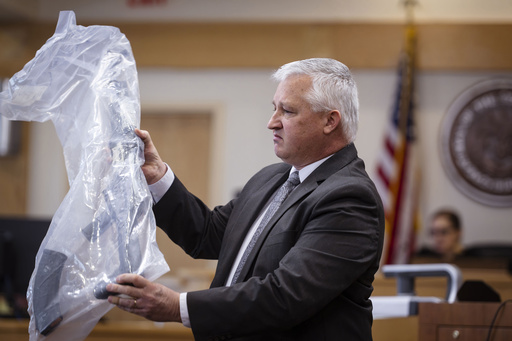ALBUQUERQUE, N.M. (AP) — Fear coursed through the Muslim community in New Mexico’s largest city over several days in the summer of 2022 as authorities scrambled to determine if race or religion might have been behind the ambush-style killings of three men from the community.
It was not long before the investigation shifted away from possible hate crimes to what prosecutors on Tuesday described as the “willful and very deliberate” actions of another member of the Muslim community – Muhammad Syed, an Afghan refugee.
Prosecutors delivered opening statements in what is the first trial for Syed, 53, who settled in the U.S. several years ago with his family.
Syed, who speaks Pashto and no English, has remained in custody without bond since his arrest. He is charged with three counts of murder and four charges of tampering with evidence. Police also have identified him as the suspect in the killing of a fourth Muslim man, but no charges have been filed in that case.
Syed faces separate trials for each victim, the first being 41-year-old Aftab Hussein. The other trials will happen over the course of the coming months.
Syed denied involvement in the killings after being detained just days after police put out a public plea for help with the unsolved killings that had rocked Albuquerque’s Muslim community. Authorities had shared photographs of a vehicle believed to be involved in the crimes, resulting in tips that led to Syed.
Police stopped him in his vehicle in August 2022 more than 100 miles (160 kilometers) from Albuquerque. He told authorities he was on his way to Texas to find a new home for his family, saying he was concerned about the killings in Albuquerque.
Prosecutors painted a picture for jurors of the night Hussein was killed, saying it was around 10 p.m. when he pulled up to his apartment complex and parked. Hussein had just stepped out of his car, still holding his keys in his hand, when gunfire erupted and he was struck multiple times.
Deputy District Attorney David Waymire showed jurors the rifle he said Syed used, telling them it was found during a subsequent search of his home. He also told jurors that forensic examination determined that casings found at the scene had been fired from that weapon.
Cellphone records indicated that Syed was at the scene before and during the shooting and that Syed had saved a note in his phone — 12 minutes before the shooting — that talked about killing Hussein, Waymire said.
“The evidence will show this was a willful and very deliberate killing,” he said. “And the evidence will show Muhammad Syed is guilty.”
While some court documents remain sealed, others shed no light on a possible motive, leaving the community struggling to understand why Hussein and the other men were targeted. Prosecutors offered no further insight during their opening statements and didn’t discuss any interactions that Syed might have had with the victim.
Defense attorney Thomas Clark told jurors that prosecutors have no evidence that Syed was the one who pulled the trigger and that there were others living in his home who also had access to the rifle, his car and his phone. Clark said the forensic evidence that will be presented by prosecutors does not include any fingerprints or DNA that would implicate his client.
“I ask you during the course of this trial to pay very close attention to what you hear and pay an equal amount of attention to what you don’t hear,” Clark said. “A determination can’t be based on speculation or conjecture.”
Prosecutors during previous court hearings described Syed as having a violent history. His public defenders have argued that previous allegations of domestic violence never resulted in convictions.
Syed also is accused of killing Muhammad Afzaal Hussain, a 27-year-old urban planner who was gunned down Aug. 1 while taking his evening walk, and Naeem Hussain, who was shot four days later as he sat in his vehicle outside a refugee resettlement agency on the city’s south side.
The judge is prohibiting prosecutors from directly introducing as evidence statements Syed made to a detective while being questioned. Defense attorneys argued that Syed’s rights were violated because the detective, through an interpreter, did not adequately inform Syed of his right to a court-appointed attorney.
Police officers and detectives testified Tuesday about arriving at the scene after Hussein had been killed. They found him lying next to his car with multiple gunshot wounds — from his ear and neck down to his legs with exit wounds in his feet.
Prosecutors showed photos of Hussein’s bullet-riddled car and said the victim was killed nearly instantly. They also said that one of the projectiles recovered from his body and casings found at the scene had been fired from the rifle seized from Syed’s home.
This website uses cookies so that we can provide you with the best user experience possible. Cookie information is stored in your browser and performs functions such as recognising you when you return to our website and helping our team to understand which sections of the website you find most interesting and useful.
